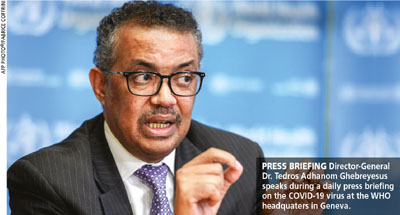LEADERSHIP NARRATIVE
CULPABILITY IN THE CRISIS
Sandesh Bartlett highlights the costly lessons in leadership amid COVID-19

On 14 January 2020, the WHO announced on Twitter that “preliminary investigations conducted by the Chinese authorities have found no clear evidence of human-to-human transmission of the novel #coronavirus.”
At the time of writing, with around 350,000 deaths and more than 5.6 million infected worldwide, it is abundantly clear that misinformation in the early onset of the COVID-19 outbreak stimulated the pandemic.
Exacerbated by the actions and attitudes espoused by some world leaders, the rate of infection has left medical staff buckling under the curve and the global economic nucleus in a painful shutdown that has resulted in millions becoming unemployed.
With the world besieged by an unseen enemy, the question of which parties might be most culpable for the spread of the virus has garnered attention.
In an interview with the BBC’s Stephen Sackur, the Ambassador of China to the UK Liu Xiaoming claimed that China’s coronavirus campaign worked in full coordination with the WHO and began when it notified the organisation through the right channels on 31 December.
However, a subsequent leak of an internal government letter by minister Ma Xiaowei of the Chinese National Health Commission – dated on the same day the WHO tweeted that China found no clear evidence of human-to-human transmission – revealed that the Chinese government was aware that the virus had an incredibly high risk of spreading among humans.
This inconsistency between Chinese internal disclosures and its public communications with the WHO (which was in turn advising the world) cost thousands of lives in the crucial early days of the outbreak. Acting on the information it was receiving from China, it would take until 11 March for the WHO to declare the outbreak a pandemic.
Beijing is now at the centre of allegations of a cover-up, which it vehemently denies and diverts. Yet, when ophthalmologist Dr. Li Wenliang – stationed at the Wuhan Central Hospital – informed medical colleagues of a strange virus bearing a resemblance to SARS of the early 2000s, he was summoned to the Public Security Bureau and reportedly intimidated into signing a letter admitting that he’d disturbed the social order.
Traffic from Wuhan, boosted by the Chinese New Year, led to the virus travelling outside the province and across the world.
As The New York Times reports, Beijing soon engaged the full apparatus of its state media to construct a narrative that the virus might have been planted by US agents – a description that loses coherence now that the United States is as President Donald Trump might bitterly admit, home to the most number of deaths (nearly 100,000 at the time of writing) on the planet.
With the US and China engaging in a subsequent war of fake news, evidence of the cover-up is incriminatory.
However, even as Beijing used its propaganda apparatus to shirk responsibility and change its global perception, several leaders across the world have invested unnecessary energy into COVID-19 denials.
While China may have started the fire (or found it, as Beijing would insist), other leaders more interested in creating an air of machismo and nonchalance have fanned the flames of the outbreak with more fake news and ill planned policy.
Brazil’s President Jair Bolsonaro – the infamous ‘Trump of the tropics’ – continues to downplay and trivialise COVID-19 in the face of 23,500 deaths and over 375,000 infections, according to Johns Hopkins Coronavirus Resource Center, to float the country’s already troubled economy.
Similarly, despite Turkish President Recep Tayyip Erdoğan’s insistence that life must carry on, Turkey recorded more than 3,000 infections a day in the first week of April, according to The Guardian.
COVID-19 denial is particularly grim in the US where Trump performs a daily act of juggling public health and espousing coronavirus denial to the core of his voter base on the road to reelection. Despite exploiting the wartime language of ‘enemy,’ ‘victorious’ and ‘siege’ to style himself a ‘liberator,’ the numbers suggest that Trump is losing his coronavirus war.
At the onset of the outbreak, Trump’s denial initially left large swathes of the American public lax to its dangers and consequences. His promise that casualties would be zero at the beginning of the pandemic contrasts chillingly with recent words at the White House that Trump considers he would have done a “very good job” if the death toll is kept below 200,000.
As countries launch misinformation campaigns to absolve themselves of their inaction, it might be easy to be tricked into taking sides.
However, what’s closer to reality is that both Chinese mismanagement and suppression of information, and subsequent COVID-19 denial campaigns espoused by leaders for whom public safety does not appear to be the top priority, are equal factors in a death toll that refuses to cease.
If there’s any lesson that can be taken from this time of crisis, it would be that COVID-19 has taught the world a costly lesson in leadership.



